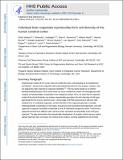Individual brain organoids reproducibly form cell diversity of the human cerebral cortex
Author(s)
Regev, Aviv
DownloadAccepted version (4.393Mb)
Terms of use
Metadata
Show full item recordAbstract
Experimental models of the human brain are needed for basic understanding of its development and disease1. Human brain organoids hold unprecedented promise for this purpose; however, they are plagued by high organoid-to-organoid variability2,3. This has raised doubts as to whether developmental processes of the human brain can occur outside the context of embryogenesis with a degree of reproducibility that is comparable to the endogenous tissue. Here we show that an organoid model of the dorsal forebrain can reliably generate a rich diversity of cell types appropriate for the human cerebral cortex. We performed single-cell RNA-sequencing analysis of 166,242 cells isolated from 21 individual organoids, finding that 95% of the organoids generate a virtually indistinguishable compendium of cell types, following similar developmental trajectories and with a degree of organoid-to-organoid variability comparable to that of individual endogenous brains. Furthermore, organoids derived from different stem cell lines show consistent reproducibility in the cell types produced. The data demonstrate that reproducible development of the complex cellular diversity of the central nervous system does not require the context of the embryo, and that establishment of terminal cell identity is a highly constrained process that can emerge from diverse stem cell origins and growth environments.
Date issued
2019-06Department
Massachusetts Institute of Technology. Department of Biology; Koch Institute for Integrative Cancer Research at MITJournal
Nature
Publisher
Springer Science and Business Media LLC
Citation
Velasco, Silvia et al. “Individual brain organoids reproducibly form cell diversity of the human cerebral cortex.” Nature 570 (2019): 523-527 © 2019 The Author(s)
Version: Author's final manuscript
ISSN
0028-0836